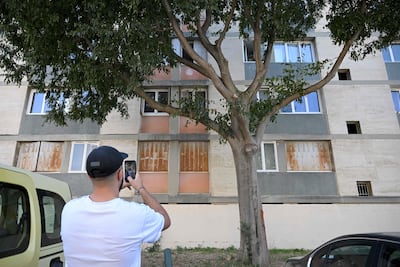In life Socayna was a law student aged 24 with a passion for learning and a resolve to make something of her life but in death she is a "collateral victim" of Marseille's gangland warfare.
The resident of France’s second city, Marseille, was killed by a stray Kalashnikov bullet that pierced the wall of the bedroom in which she was working late into Sunday night.
A gunman on a scooter fired 23 times, apparently to terrify rivals in the lucrative drug trade of Marseille’s crime-infested northern districts.
The target may have been a sales pitch set up recently in the previously calm Saint-Thys estate in the city’s 10th arrondissement, where Socayna lived with her mother, Leila, and 14-year-old sister. But the firing was indiscriminate.
Leila, at first thinking the salvo was from fireworks, hurried to the bedroom of her elder daughter, who had just passed her carrying a cup of coffee, and found her in a “river of blood”, her face disfigured.
After being pronounced brain-dead, Socayna died in hospital on Tuesday morning.
“I am full of sadness for this young woman but also feel anger about a preventable tragedy,” said Mathieu Croizet, a lawyer involved in efforts to sue the French government for infringing human rights by failing to deal effectively with rampant lawlessness.
Mr Croizet told The National: “As the violence spreads, people away from the banlieues see they are not safe either. They can be at their gym, watching rugby in their own homes and still get a stray bullet in the face.”
In tearful but dignified interviews, Leila, 59, who works with disabled children, told of the shattered dreams of an ambitious young woman whose death has given new focus to the uphill struggle to end the cycle of violence.
Socayna had switched to law studies after working in telecoms. “It was rare to see her on her phone,” her mother told the newspaper Aujourd’hui en France. "For Socayna, it was always books. At 3am you could tap on her door and find her reading.

“I have lost my daughter. I gave everything for her. She was my sister, my secretary, she was everything for me.”
Marseille’s crime statistics are shocking. This year alone, with two more deaths added to the list even since the shooting of Socayna, at least 43 people have been killed in drug-related attacks.
They include two others unconnected to the gang warfare, a boy of 10 in August and a man of 63 in April. The total for the whole of 2022, already an increase on the previous year, was 32. Scores more have been wounded.
“Here in Marseille, it’s war,” Leila, her face unseen, told FranceInfo’s TV channel. “I blame the state, too, because even the police can no longer do anything.”
Officials admit Marseille is in crisis – one headline portrayed the battle against drug dealers as already lost – but say successive police reinforcements may have prevented even more bloodshed. A total of 330 officers have been recruited in two years and a new specialist unit of 70 will be in place by November.

Gerald Darmanin, the Interior Minister, visited the southern city on Tuesday and described Socayna as the “collateral victim of either score-setting or the conquest or reconquest of a drug-dealing pitch in an area that was not the city’s most crime-ridden”.
The wave of killings is not a new phenomenon in Marseille but the problem has grown steadily worse over the past two decades. The spread to previously unaffected areas aggravates the security headache facing police ahead of a visit by Pope on September 22-23.
In the immigrant-dominated tower blocks of the northern districts, the anguish of mothers fearing for their children’s safety – often without no father figure present – is harrowing.
After one attack left a boy of 16 dead and two teenagers wounded in April, women marched to demand an end to “the killing of our children”. Similar protests 10 years earlier had brought sympathetic attention but little else.
Research has highlighted the ease with which the gangs can secure supplies of hashish from North Africa, cocaine from South America and enough powerful weapons to offset significant police seizures. Unemployed teenagers, many originating in Algeria or Nigeria, can earn up to €200 ($213) a day for acting as petty dealers or lookouts; some are willing to carry out contract killings for a fifth of the €100,000 “professional” hitmen would demand.
Mr Croizet acts for the Marseille organisation Conscience, helping families from the banlieues. He believes police should station officers permanently in dangerous areas instead of merely reacting to events.
President Emmanuel Macron has pledged €5 billion to a master plan to fund public transport, school renovation and education schemes along with steps to end the alienation of the northern districts, but it is not clear how successful this will be in “no-go” areas where residents feel detached from French society and abandoned by the country.
Mr Croizet has gone to court twice in attempts to have the state judged culpable for not taking adequate measures to tackle the gang warfare. Both were dismissed as inadmissible.
“The first time, the judge said our case was too precise, the second time that it was too big, effectively not precise enough,” he said. “It’s a bit like Goldilocks and the Three Bears: the first soup was too hot, the next too cold. Maybe in our third attempt, we’ll serve it at an admissible temperature.”


